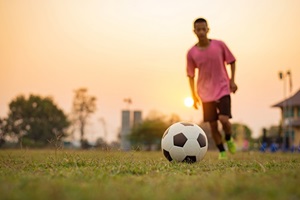Kids Should Hold Off on Focusing on Just One Sport

Exceptional athletes are just that: exceptional.
Part of what makes them so outstanding is a combination of physical ability, attitude and specialized, consistent training. But when is an athlete – even one who may show early promise in a particular sport – too young to focus on just one sport or even one position within that sport? What are the potential consequences of specializing too soon?
“If kids are younger than age 14 – or 9th grade high school freshmen – I would skew against specialization,” says Heather Rainey, MD, a sports medicine and physical medicine and rehabilitation specialist at MetroHealth Sports Medicine and Physical Therapy in Broadview Heights.
“We worry about overuse injuries caused when the athlete does the same thing again and again,” says Dr. Rainey.
“In younger children, those injuries can include growth-plate injuries as well as wear and tear on tendons.”
But it goes beyond physical concerns, says Dr. Rainey. Specializing too soon can create emotional and behavioral issues. “Because they’re focused on one sport and one aspect of training for that sport, these kids can become isolated from others. When that happens, we often see depression and burnout.”
Dr. Rainey says there can be early-specialization issues with every sport, though some carry lower risks. “Figure skaters and gymnasts tend to hit their peak in their early teen years, which can be less concerning because those athletes don’t play as long.” But, she cautions, “In team sports and sports like track and field, problems can crop up if younger athletes specialize too early.”
“There can be stress fractures in distance runners and shoulder issues in swimmers,” she says. “Just don’t specialize early on. Be more well-rounded.” Dr. Rainey points to the approach followed by many professional athletes. “Many pros played multiple sports before they specialized, and that allowed their bodies to move in different ways versus just one particular way seen with specialization.”
Running the Risk
What should parents, coaches and trainers watch for that might indicate problems? Dr. Rainey says to pay attention to changes in performance.
“If speed or energy is not what is should be, a coach or trainer should talk with the young athlete and parents,” explains Dr. Rainey. “In little kids, especially, there’s a lot of risk to growth plates, and that has long-term implications.”
What she doesn’t want to see is kids becoming discouraged by overuse pain or injury resulting from specializing too young, causing them to give up on sports altogether. When kids sit out of recreational or competitive play, that inactivity may bring on problems like becoming overweight, which can lead to other health issues.
Dr. Rainey says there is no real upside to sports specialization when the child is in middle school or younger.
“There’s not a real benefit to it,” she explains, “and it won’t be an advantage for scholarships later.” Her guideline is that young athletes spend no more hours per week in specialized play or training than their age in years.
“Kids who are focusing on one sport, year-round, for hours and hours per week, are at risk,” she explains.
To reduce that risk, Dr. Rainey suggests training and conditioning programs that challenge younger bodies in different ways.
“This can help develop strength and flexibility,” she explains, both of which can help offset potential overuse injury.
She also recommends taking a couple of months off each year, which can be beneficial both physically and mentally. It’s important that parents be their child’s advocates. Parents who are concerned that their child may be at risk for overuse injuries resulting from specialization too early should talk with the child’s health care provider and with trainers and coaches.
Our Sports Medicine team is available in Broadview Heights, Cleveland Heights, Cleveland - Main Campus and Parma. To learn more, or to schedule an appointment, please call 216-95-SPORT (77678).
We also offer physical therapy throughout the community.
